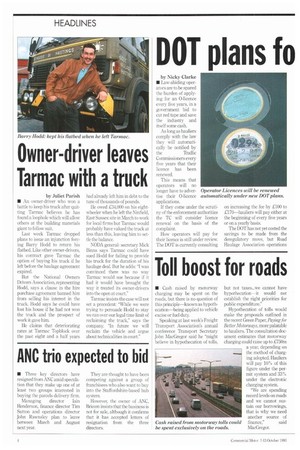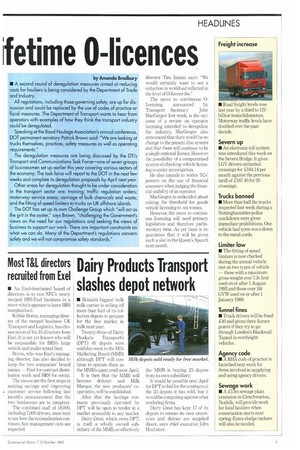DOT plans fo Ifetime 0-licences
Page 6

Page 7

If you've noticed an error in this article please click here to report it so we can fix it.
by Amanda Bradbury
by Nicky Clarke • Law-abiding operators are to be spared the burden of applying for an 0-licence every five years, in a government bid to cut red tape and save the industry and itself some cash.
As long as hauliers comply with the law they will automatically be notified by the Traffic Commissioners every five years that their licence has been renewed.
This means that operators will no longer have to advertise their 0-licence applications If they come under the scrutiny of the enforcement authorities the TC will consider licence renewal on the basis of the complaint.
How operators will pay for their licence is still under review. The DOT is currently consulting on increasing the fee by £100 to £170—hauliers will pay either at the beginning of every five years or on a yearly basis.
The DOT has not yet costed the savings to be made from the deregulatory move, but Road Haulage Association operations • A second round of deregulation measures aimed at reducing costs for hauliers is being considered by the Department of Trade and Industry.
All regulations, including those governing safety, are up for discussion and could be replaced by the use of codes of practice or fiscal measures. The Department of Transport wants to hear from operators with examples of how they think the transport industry could be deregulated.
Speaking at the Road Haulage Association's annual conference, DOT permanent secretary Patrick Brown said: 'We are looking at trucks themselves, practices, safety measures as well as operating requirements."
The deregulation measures are being discussed by the DTi's Transport and Communications Task Force—one of seven groups of businessmen set up earlier this year covering various sectors of the economy. The task force will report to the DOT in the next few weeks and complete its deregulation proposals by April next year.
Other areas for deregulation thought to be under consideration in the transport sector are: training; traffic regulation orders; motorway service areas; carriage of bulk chemicals and waste; and the fitting of speed limiters to trucks on UK offshore islands.
The DOT has set up its own Challenge Group which "will act as the grit in the oyster,' says Brown, "challenging the Government's views on the need for our regulations and seeking the views of business to support our work. There are important constraints on what we can do. Many of the Department's regulations concern safety and we will not compromise safely standards." director Tim Inman s;lys: "We would certainly want to see a reduction in workload reflected in the level of 0-licence fee."
The move to continuous 0
licensing, announced by Transport Secretary John MacGregor last week, is the outcome of a review on operator licensing intended to deregulate the industry. MacGregor also announced that there would be no change to the present disc system and that there will continue to be a single national licence. However the possibility of a computerised system of checking vehicle licensing is under investigation.
He also intends to widen TCs' powers on the use of financial assessors when judging the financial stability of an operator.
MacGregor is undecided about raising the threshold for goods vehicle licensing to six tonnes.
However, the move to continuous licensing will need primary legislation and therefore parliamentary time. As yet there is no guarantee that it will be given such a slot in the Queen's Speech next month.




























































































